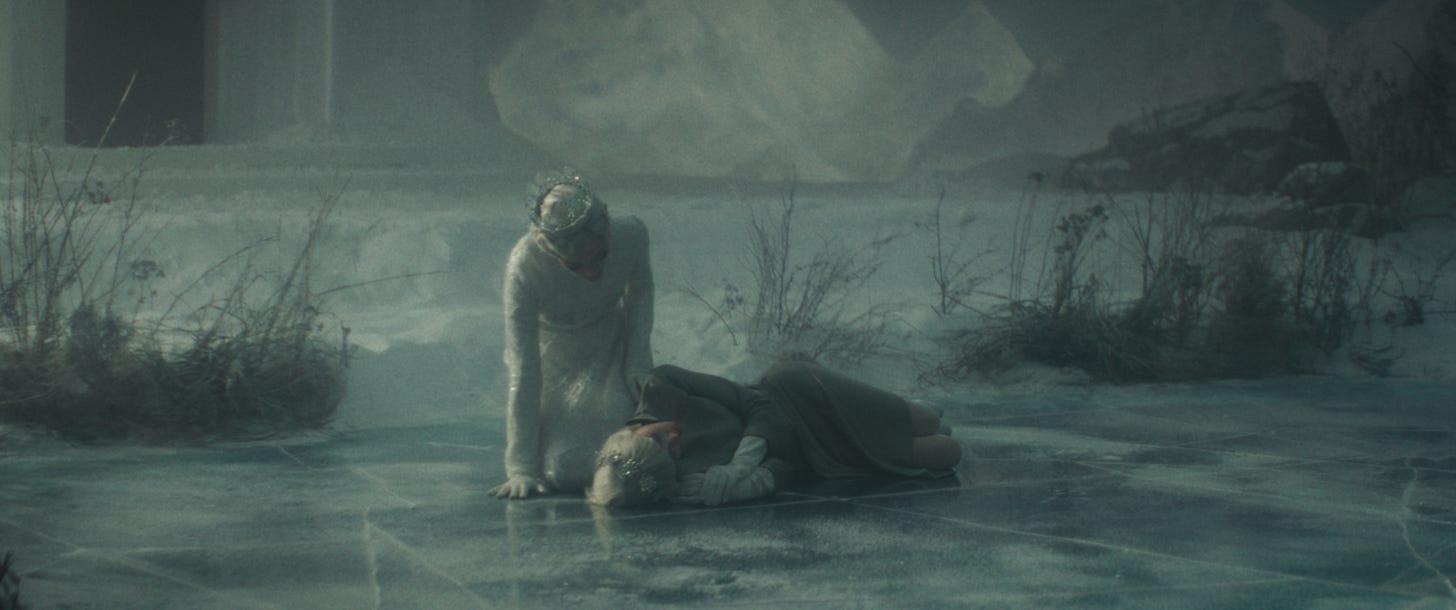An arthouse, adult fairy tale-like story of The Ice Tower (La tour de glace, 2025) might be defined by its haunting visual style, symbolic depth, and hypnotic performances. With its slow burn and sparse plot, however, it gets to the point you cannot escape, but call it slow cinema. Slow cinema, even. Nothing wrong with that, quite the contrary for me. It’s a visually astonishing film that somehow didn’t fully get me.
Set in the 1970s, 15-year-old Jeanne (Clara Pacini in her debut role) longs to escape her remote mountain orphanage and experience the wider world. She runs away to the city, finding shelter for the night in a small shed. By morning, she encounters a dazzling figure—the Snow Queen. It turns out the shed is actually a film set, where an adaptation of Hans Christian Andersen’s “The Snow Queen” is being shot. Cristina (Marion Cotillard), the actress playing the Queen, commands the production with an air of both power and fragility. Jeanne, captivated by Cristina’s harsh beauty and enigmatic presence, becomes her shadow, exploring how fiction and reality blend indistinguishably.
In short – a girl loses her beloved but detached mother to suicide and channels her feelings towards Cotillard’s literal ice queen, who alternately exerts affection and cruelty. An uneasy, intimate power dynamic with material and even erotic overtones driving the central tension between the two protagonists comes to play, highlighting themes of desire, vulnerability, social ritual, and mentorship veering into manipulation. Before watching, read Andersen’s “The Snow Queen” and some Freud.
Whether deliberately or not, Lucile Hadžihalilović (Innocence) steers her film towards all art-film-only vibes with symbolic mise-en-scène. Reflective surfaces like ice, mirrors, glass, and camera lenses are used metaphorically, referencing Andersen's cursed mirror – a motif that recurs to mirror characters' identities and illusions. As such, The Ice Tower relies mostly on the performances and visual poetry. Cotillard and Pacini’s intense performances are mesmerising and magnetic. Especially Cotillard, who, with one of the great faces and naturally classical sophistication, fits perfectly Andersen’s elusive but wounded Queen. Pacini also leaves a strong impression, playing her character in a manner that could easily fit among the protagonists of Weir’s Picnic at Hanging Rock (1975), and its hypnotic atmosphere and haunting ambiguity, while evoking the original fairy tale’s feeling of being lost.
Oh, there’s also Gaspar Noé, privately Hadžihalilović’s husband and creative partner, playing a director, not as much running the ‘70s film set as haunting it with his shadow lingering in the story, with a moustache that would make Count Orlok proud.
And the artistic vision, gorgeous sets, and striking cinematography are unforgettable parts of The Ice Tower that the film cannot be denied. Rich texture and atmosphere that makes you feel the chill of winter wind on your skin, captivate the viewer in its aesthetic integrity and nostalgic, haunting tone. The artful production design with sets recreating an artificial snow realm and costumes (like Cotillard’s regal white gown) make it all an almost immersive experience. Cinematographer Jonathan Ricquebourgh (The Taste of Things) outdid himself, and I admit it – when it comes to what we see on the screen, the whole team behind the film fully deserved the Silver Bear for Outstanding Artistic Contribution.
Marked by its minimalist pacing, long takes, butterscotch lighting, icy palette, and immersive sound design, the glacial, dreamlike atmosphere evokes a fairy-tale mood. The classic one – far, far away from Disney. Yet, when it comes to what is actually happening on the screen, it somehow gets too far into its own dreamlike creation, putting you in a state of trance to the point of frustrating indefiniteness. The slender plot then feels stretched, making the narrative appear thin. The blurred lines between art and life – like a dark hole.
I feel like I should have really loved it, yet all the aspects weren’t really there, with aestheticism winning over narrative. A beautiful dream – not to be repeated.
Watched at the 2025 Berlinale back in February. This month, it’ll be presented as part of the New Horizons Film Festival in Wrocław, Poland.





